我們如何定義東亞
Typically, East Asia is considered to encompass China, Hong Kong, Japan, Macau, Mongolia, North Korea, South Korea and Taiwan. In geopolitical terms, Vietnam is often categorized as part of Southeast Asia. But we surveyed Vietnam along with East Asia for several reasons, including its historic ties to China and Confucian traditions. Moreover, Buddhists in Vietnam practice the same strain of Buddhism (Mahayana) found across East Asia.
Throughout this report, the term “East Asia” refers to Hong Kong, Japan, South Korea and Taiwan.
When discussing trends throughout the broader “region,” we include Vietnam.
For legal and logistical reasons, we did not survey several other places that are generally considered part of East Asia. At present, China does not allow non-Chinese organizations to conduct surveys on the mainland, and public opinion surveys are not possible in North Korea. Conducting nationally representative surveys in Mongolia is difficult due to the nomadic lifestyle of a large part of its people. We did not survey Macau because its population is relatively small.
Some standard ways of measuring religious beliefs, such as asking about belief in god, are grounded in monotheistic religions – particularly Judaism, Christianity and Islam – that hold there is only one God.
一些衡量宗教信仰的標準方法,例如詢問對上帝的信仰,都是基於一神教的宗教——特別是猶太教、基督教和伊斯蘭教——這些宗教認為只有一位上帝。
Such metrics may miss key elements of religious and spiritual life in East Asia and Vietnam. So while we did ask about belief in god on this survey, over the past seven years we have consulted with experts from the region to develop measurement tools that capture a much wider range of religious and spiritual beliefs.
這些指標可能會忽略東亞和越南宗教和精神生活的關鍵元素。因此,儘管我們在這次調查中詢問了對神的信仰,但在過去七年中,我們已經與該地區的專家進行了諮詢,以開發能夠捕捉更廣泛宗教和精神信仰的測量工具。
For instance, in Japan’s traditional Shinto belief system, kami are spirits or deities that inhabit the land and imbue forces of nature like the wind. To measure the prevalence of similar beliefs across the region, we devised separate questions asking whether spirits exist in the natural landscape (mountains, rivers or trees); the human-built landscape (houses or other buildings); and physical objects (crystals, jewels or stones).
例如,在日本傳統的神道信仰體系中,神靈是居住在土地上並賦予自然力量(如風)的靈體或神祇。為了測量類似信仰在該地區的普遍性,我們設計了不同的問題,詢問是否有靈體存在於自然景觀(山脈、河流或樹木);人造景觀(房屋或其他建築物);以及物理物體(晶體、珠寶或石頭)中。
We find that across the region, the belief that spirits inhabit mountains, rivers or trees is particularly widespread. Half of adults surveyed in Japan express this belief, as do 47% in Vietnam and 59% in Taiwan.
我們發現,在整個地區,認為靈魂居住在山川或樹木中的信仰特別普遍。在日本,半數受訪的成年人表達了這種信仰,越南有 47%,台灣則有 59%。
(For more information on the veneration of kami in Japan, refer to Chapter 4.)
(有關在日本崇拜神靈的更多資訊,請參閱第 4 章。)
More broadly, most people in all the region’s major religious groups – Buddhists, Christians and Daoists (also spelled Taoists) – believe in the existence of unseen beings, like deities or spirits. But some religiously unaffiliated people also hold this belief: Across the region, the share of unaffiliated adults who say they believe in unseen beings ranges from 39% to 73%.
更廣泛地說,該地區所有主要宗教群體中的大多數人——佛教徒、基督徒和道教徒(也拼寫為 Taoists)——都相信看不見的存在,如神靈或靈魂。但一些沒有宗教信仰的人也持有這種信念:在整個地區,表示相信看不見存在的無宗教信仰成年人比例從 39%到 73%不等。
Overall, respondents in East Asia and Vietnam are more likely to say they believe in unseen beings, like deities or spirits, than to say they believe in god. Only in Taiwan does a clear majority of the public express belief in god.
總體而言,東亞和越南的受訪者更可能表示他們相信看不見的存在,如神靈或靈魂,而不是說他們相信上帝。只有在台灣,明顯多數的公眾表達了對上帝的信仰。
Taiwanese adults also stand out as the most likely to hold several of the other beliefs measured in this survey, including belief in angels or helpful deities, fate, karma and miracles.
台灣成年人在這項調查中也顯得特別突出,他們最有可能持有其他幾種信仰,包括對天使或有幫助的神靈、命運、因果報應和奇蹟的信仰。
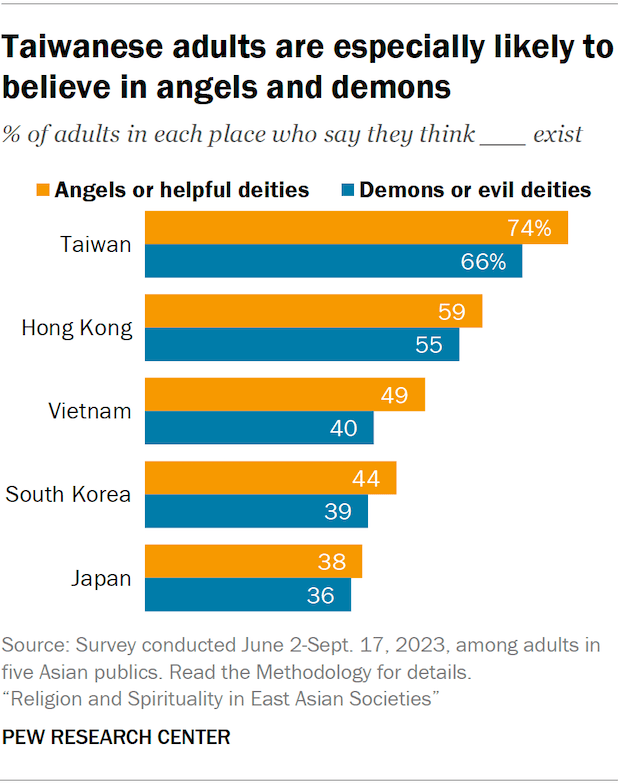
On balance, slightly larger shares tend to believe in angels or helpful deities than in demons or evil deities.
總的來說,相對較多的人傾向於相信天使或有幫助的神靈,而不是惡魔或邪惡的神靈。
Women across the region are generally more believing than men. This aligns with a common gender divide in religiosity seen in many societies around the world.
整個地區的女性普遍比男性更有信仰。這與世界上許多社會中常見的宗教性別差異一致。
(For information on beliefs about the afterlife – including rebirth, heaven, hell and more – go to Chapter 5.)
(有關來世信仰的資訊——包括重生、天堂、地獄等——請參見第 5 章。)
Belief in unseen beings
對無形存在的信仰
In all the places we surveyed, at least half of respondents say they believe in “unseen beings in the world, like deities or spirits.” This belief is most common in Taiwan, where 85% say they think unseen beings exist.
在我們調查的所有地區中,至少有一半的受訪者表示他們相信「世界上有看不見的存在,如神靈或靈魂」。這種信仰在台灣最為普遍,有 85%的人表示他們認為看不見的存在是存在的。
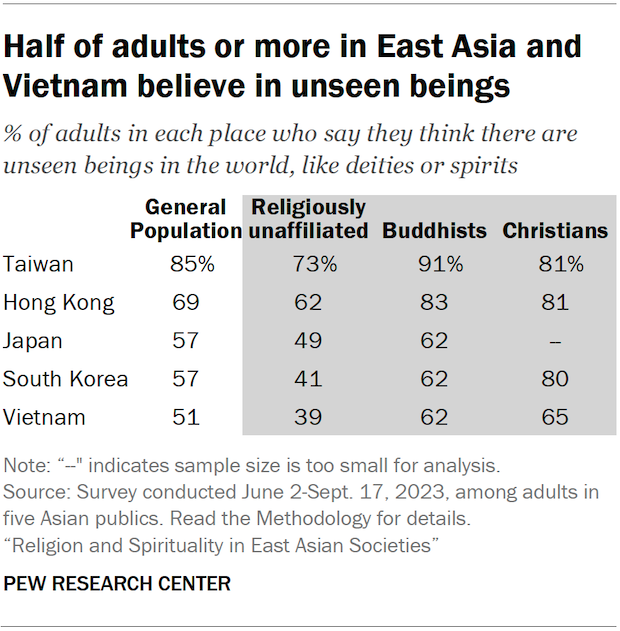
Buddhists and Christians are more likely than religiously unaffiliated people to say they believe in unseen beings. In South Korea, for example, 80% of Christians and 62% of Buddhists say they believe in such beings, compared with 41% of the unaffiliated.
佛教徒和基督徒比起沒有宗教信仰的人更有可能表示他們相信看不見的存在。例如,在韓國,80%的基督徒和 62%的佛教徒表示他們相信這樣的存在,而沒有宗教信仰的人中只有 41%這麼認為。
Still, in each of the places we surveyed, roughly four-in-ten unaffiliated adults or more say they believe in unseen beings. This includes solid majorities of the unaffiliated in Taiwan (73%) and Hong Kong (62%).
儘管如此,在我們調查的每個地方,大約四成或更多的無宗教信仰成年人表示他們相信看不見的存在。這包括台灣無宗教信仰者的絕大多數(73%)和香港(62%)。
Belief in unseen beings is also very common among other religious groups in Taiwan. For example, 97% of Taiwanese who identify with local or Indigenous religions say they believe in unseen beings, as do 89% of Daoists.
在台灣,其他宗教團體對於看不見的存在的信仰也非常普遍。例如,97%認同本土或原住民宗教的台灣人表示他們相信看不見的存在,道教徒中也有 89%持相同的信仰。
Respondents who have completed higher levels of education are more likely than those with less education to believe in unseen beings, like deities or spirits. For example, almost eight-in-ten college-educated residents in Hong Kong believe in unseen beings, compared with 64% of those with less education.
受訪者中,受過高等教育的人比受教育程度較低的人更有可能相信看不見的存在,如神靈或靈魂。例如,香港近八成受過大學教育的居民相信看不見的存在,而受教育程度較低的人中有 64%持相同看法。
Belief in god 信仰上帝
Views of whether god exists vary somewhat throughout East Asia and Vietnam. About seven-in-ten Taiwanese adults say they believe in god, while less than half of adults in South Korea (43%) and Japan (42%) say the same.
關於神是否存在的看法在東亞和越南各地有所不同。大約七成的台灣成年人表示他們相信有神,而在南韓和日本,表示相信有神的成年人不到一半,分別為 43%和 42%。
(The survey did not define “god,” and translators were instructed to choose as generic a term as possible, avoiding terms that refer to a specific religion’s god(s) or goddess(es). We did this so we could ask the same question of respondents in different religious groups without necessarily implying a monotheistic god.)
調查並未對「神」進行定義,翻譯人員被指示選擇盡可能通用的術語,避免使用指特定宗教的神或女神的術語。我們這樣做是為了能夠向不同宗教群體的受訪者提出相同的問題,而不必然暗示一個一神教的神。
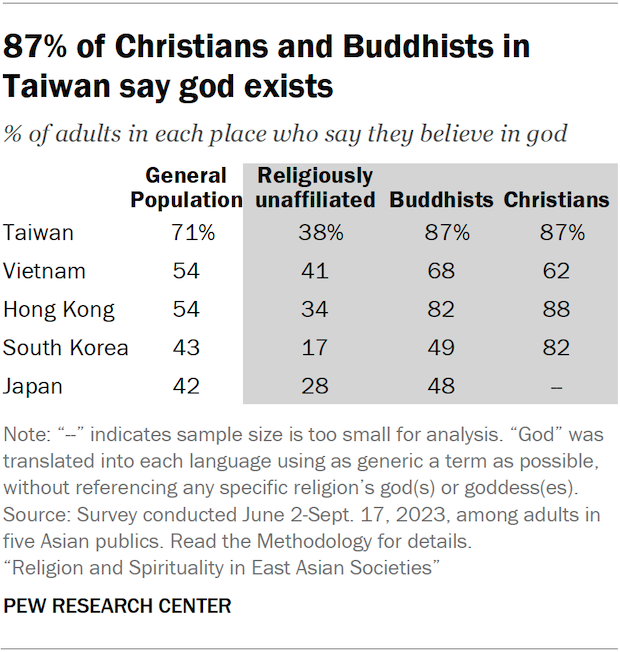
Majorities of Christians throughout the region say they believe in god. Among Christians, belief in god is lowest in Vietnam (62%).
在整個地區,大多數基督徒表示他們相信上帝。在基督徒中,越南的信仰率最低(62%)。
And among Buddhists, belief in god is widespread in Taiwan (87%), Hong Kong (82%) and, to a lesser extent, Vietnam (68%). Even though belief in god is not considered an essential aspect of Buddhism, there is no significant difference between the rates at which Buddhists and Christians in these three places express belief in god.
在佛教徒中,台灣(87%)、香港(82%)和越南(68%)的信仰上帝現象普遍存在。儘管信仰上帝並不被認為是佛教的核心要素,但在這三個地方,佛教徒和基督徒表達信仰上帝的比例並沒有顯著差異。
Substantial minorities of religiously unaffiliated adults surveyed also say they believe in god. For example, 38% of Taiwanese respondents who identify with no religion say they believe in god.
相當多的無宗教信仰成年人在調查中也表示他們相信上帝。例如,38%的台灣受訪者表示他們沒有宗教信仰,但相信上帝。
In general, younger adults (ages 18 to 34) are somewhat less likely than older adults (35 and older) across the region to believe in god. But the opposite is true in Vietnam, where younger adults are slightly more likely than older adults to express belief in god (58% vs. 52%).
一般來說,整個地區的年輕成年人(18 至 34 歲)比年長成年人(35 歲及以上)更不太可能相信上帝。但在越南情況正好相反,年輕成年人比年長成年人更有可能表達對上帝的信仰(58%對 52%)。
Belief in god compared with belief in unseen beings
信仰上帝與信仰看不見的存在相比
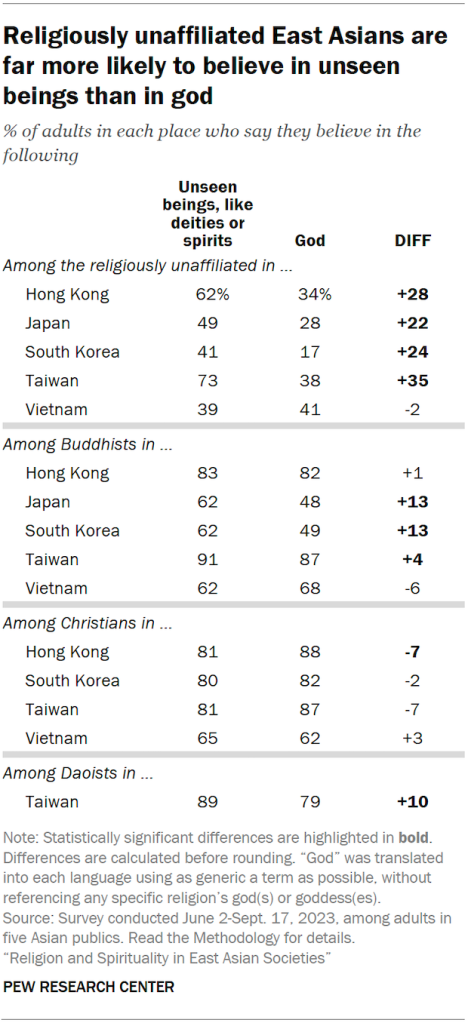
People throughout the region typically are more likely to say they believe in unseen beings, like deities or spirits, than in god.
整個地區的人通常更可能說他們相信看不見的存在,如神靈或靈魂,而不是上帝。
This trend is largely driven by religiously unaffiliated people. In four of the five places we surveyed, the difference is at least 20 percentage points, with the widest gap in Taiwan: 73% of religiously unaffiliated Taiwanese adults say unseen beings exist, but only 38% believe in god.
這一趨勢主要由無宗教信仰的人推動。在我們調查的五個地點中,有四個地點的差距至少有 20 個百分點,其中台灣的差距最大:73%的無宗教信仰台灣成年人認為看不見的存在是存在的,但只有 38%的人相信有神。
Among Christians, these differences are generally much smaller and not statistically significant. In Hong Kong, though, the pattern is reversed: Slightly more Christians believe in god (88%) than in unseen beings (81%).
在基督徒中,這些差異通常較小且沒有統計上的顯著性。然而,在香港,情況則相反:相信上帝的基督徒(88%)略多於相信無形存在的基督徒(81%)。
(Some survey respondents may consider belief in god to be part of belief in unseen beings, like deities or spirits.)
(一些調查受訪者可能認為對神的信仰是對看不見的存在,如神祇或靈魂的信仰的一部分。)
Belief in angels and demons
對天使和惡魔的信仰
In addition to asking about belief in god and belief in unseen beings, the survey also asked respondents whether they believe in the existence of “angels or helpful deities” and, separately, in “demons or evil deities.”
除了詢問對神的信仰和對看不見的存在的信仰外,調查還詢問受訪者是否相信“天使或有幫助的神靈”,以及是否相信“惡魔或邪惡的神靈”。
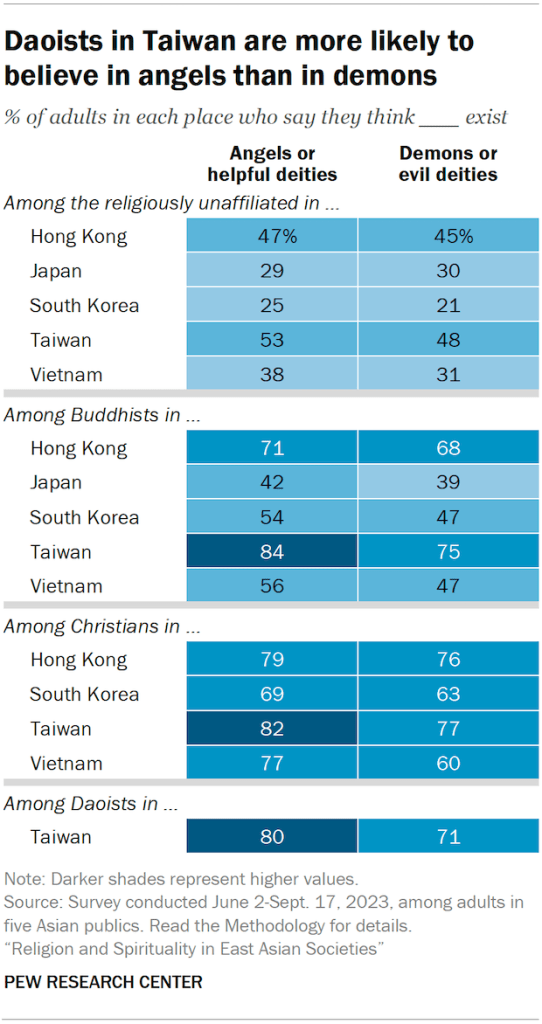
Christians typically are more likely than Buddhists to believe in angels and demons. In South Korea, for example, more Christians than Buddhists say both that angels or helpful deities exist (69% vs. 54%) and that demons or evil deities exist (63% vs. 47%).
基督徒通常比佛教徒更相信天使和惡魔。例如,在南韓,更多的基督徒比佛教徒認為天使或有幫助的神靈存在(69% 對 54%),以及惡魔或邪惡的神靈存在(63% 對 47%)。
In all the places surveyed, one-fifth of the religiously unaffiliated or more say both kinds of deities exist.
在所有受調查的地區中,五分之一或更多的無宗教信仰者表示兩種神靈都存在。
Women are consistently more likely than men to express belief in angels and demons. For instance, 61% of women in Hong Kong say demons or evil deities exist, compared with 49% of men.
女性比男性更容易表達對天使和惡魔的信仰。例如,61%的香港女性認為惡魔或邪神存在,而男性則為 49%。
In most places surveyed, people are somewhat more likely to believe in angels or helpful deities than in demons or evil deities. In Vietnam, for example, 49% say angels or helpful deities exist, while 40% say demons or evil deities exist. This pattern mirrors results we have previously found across South and Southeast Asia.
在大多數受調查的地方,人們更有可能相信天使或有幫助的神靈,而不是惡魔或邪惡的神靈。例如,在越南,49% 的人認為天使或有幫助的神靈存在,而 40% 的人認為惡魔或邪惡的神靈存在。這一模式反映了我們之前在南亞和東南亞發現的結果。
Belief in spirits inhabiting the physical world
相信靈魂居住在物質世界
Throughout the region, natural forces and certain places have long been considered to have spirits or connections to divinity. To measure this, we asked a series of questions about whether mountains or other parts of nature; houses or other buildings; and objects like crystals or jewels have their own spirits.
在整個地區,自然力量和某些地方長期以來被認為具有靈性或與神靈有聯繫。為了衡量這一點,我們提出了一系列問題,詢問山脈或其他自然部分;房屋或其他建築物;以及像水晶或珠寶這樣的物品是否擁有自己的靈性。
Here’s what we found:
以下是我們發現的內容:
- Respondents in all five places are most likely to say that mountains, rivers or trees have their own spirits. Large shares of people in Taiwan (59%), Japan (51%) and Vietnam (47%) express this view.
在所有五個地區的受訪者中,大多數人認為山川或樹木有自己的靈魂。台灣(59%)、日本(51%)和越南(47%)有大量民眾持這種觀點。 - Adults in those three places also are more likely than people in South Korea and Hong Kong to say that houses or other buildings have their own spirits.
在這三個地方的成年人也比南韓和香港的人更有可能說房屋或其他建築物有自己的靈魂。 - Nowhere do more than three-in-ten adults believe that objects like crystals, jewels or stones have spirits.
沒有任何地方有超過三成的成年人相信水晶、寶石或石頭等物品有靈魂。
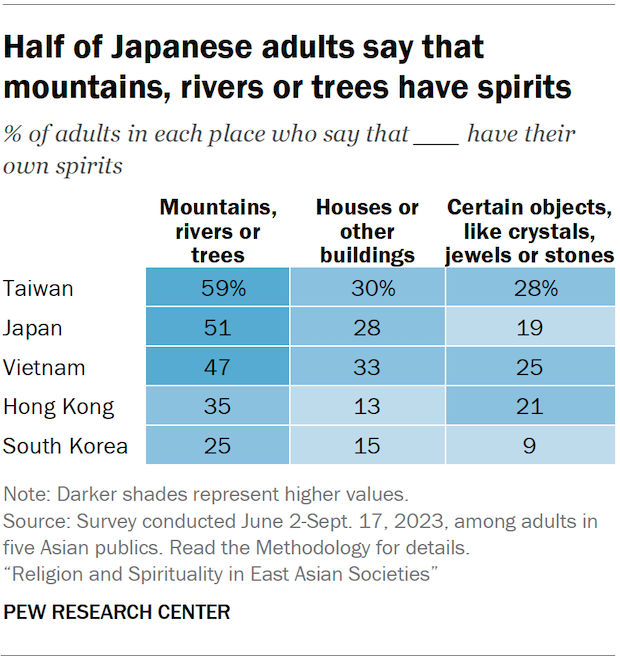
In general, Buddhists are more likely than Christians and unaffiliated people to say that each category listed has its own spirits.
一般來說,佛教徒比基督徒和無宗教信仰者更有可能認為每個列出的類別都有其自己的靈體。
And the religiously unaffiliated are somewhat more likely than Christians to say that objects like crystals have their own spirits, and to say the same about mountains, rivers or trees. For example, 22% of unaffiliated adults in Vietnam say crystals, jewels or stones have spirits, compared with 14% of Vietnamese Christians.
而且,宗教上沒有信仰的人比基督徒更有可能認為水晶等物品有自己的靈魂,並且對山脈、河流或樹木也持相同看法。例如,在越南,22%的無宗教信仰成年人認為水晶、寶石或石頭有靈魂,而越南基督徒中只有 14%這樣認為。
In most of the places surveyed, women are more likely than men to say that parts of nature, certain objects, and houses or other buildings have their own spirits. The sole outlier is Vietnam, where men and women are about equally likely to hold these beliefs.
在大多數受調查的地區,女性比男性更有可能認為自然的一部分、某些物體以及房屋或其他建築物有自己的靈魂。唯一的例外是越南,男性和女性持有這些信仰的可能性大致相同。
Belief in fate 相信命運
Majorities of adults across all major religious groups in the five locations say that fate exists. (The survey did not define the word, but fate is often described as the idea that important events, or even the overall course of one’s life, are largely or wholly preordained.)
在五個地區的所有主要宗教群體中,大多數成年人都認為命運存在。(調查沒有對這個詞進行定義,但命運通常被描述為重要事件,甚至是整個人生的進程,在很大程度上或完全是預先注定的。)
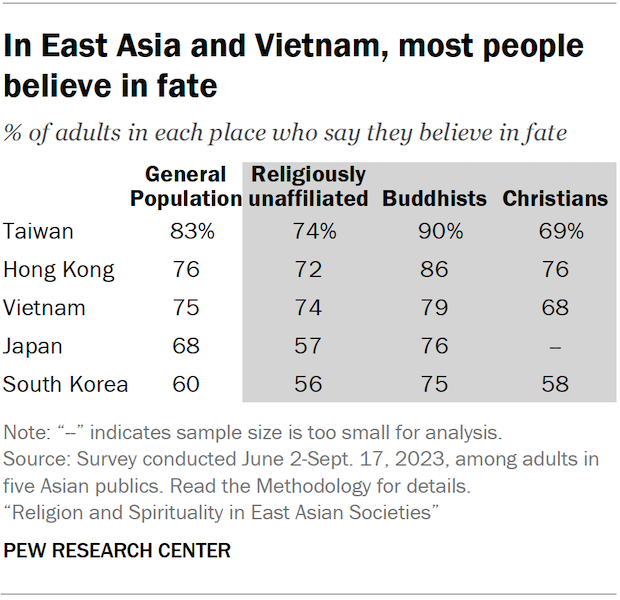
Buddhists across the region are particularly likely to say that fate exists.
該地區的佛教徒特別可能認為命運存在。
As with other beliefs analyzed in this chapter, belief in fate differs by gender. Across East Asia and Vietnam, women consistently are more likely than men to say fate exists. In South Korea, for instance, 64% of women and 55% of men believe in fate.
與本章分析的其他信仰一樣,對命運的信仰也因性別而異。在東亞和越南,女性比男性更有可能認為命運存在。例如,在韓國,64%的女性和 55%的男性相信命運。
Belief in karma 相信因果報應
Belief in karma is very common among adults in Taiwan (87%), Hong Kong (76%) and Vietnam (75%), while South Koreans are more evenly split. (The survey did not define “karma,” but it is generally understood to mean that people will reap the benefits of their good deeds and pay the price for their bad deeds, often in future lives.)
在台灣(87%)、香港(76%)和越南(75%)的成年人中,相信因果報應是非常普遍的,而南韓人則較為均衡。(調查並未定義“因果報應”,但一般理解為人們將會因其善行而受益,並因其惡行而付出代價,通常在未來的生命中。)

Only 16% of Japanese adults say they believe in karma. Nearly three-in-ten Japanese adults declined to answer the question, far more than in the other places surveyed. This may indicate less familiarity with the term.
只有 16%的日本成年人表示他們相信因果報應。近三成的日本成年人拒絕回答這個問題,遠高於其他受調查地區。這可能表明他們對這個術語不太熟悉。
In most places surveyed, Buddhists are the most likely to say karma exists. While this may be expected – since the concept of karma has deep roots in Buddhist traditions – majorities of Christians in Vietnam, Hong Kong and Taiwan also say karma exists. For example, 71% of Vietnamese Christians believe in karma. Many of the region’s religiously unaffiliated adults, including 78% in Taiwan, also believe in karma.
在大多數受調查的地區,佛教徒最有可能說因果報應存在。雖然這是意料之中的——因為因果報應的概念在佛教傳統中有深厚的根基——但越南、香港和台灣的大多數基督徒也說因果報應存在。例如,71%的越南基督徒相信因果報應。該地區許多沒有宗教信仰的成年人,包括台灣的 78%,也相信因果報應。
In Taiwan, belief in karma seems to be very common across the board, including among Daoists (92%) and followers of local or Indigenous religions (97%).
在台灣,因果報應的信仰似乎非常普遍,包括道教徒(92%)和本地或原住民宗教的信徒(97%)。
Belief in miracles 相信奇蹟
In all five places surveyed, at least half of adults say that miracles exist.
在所有五個受調查的地區中,至少有一半的成年人表示奇蹟存在。
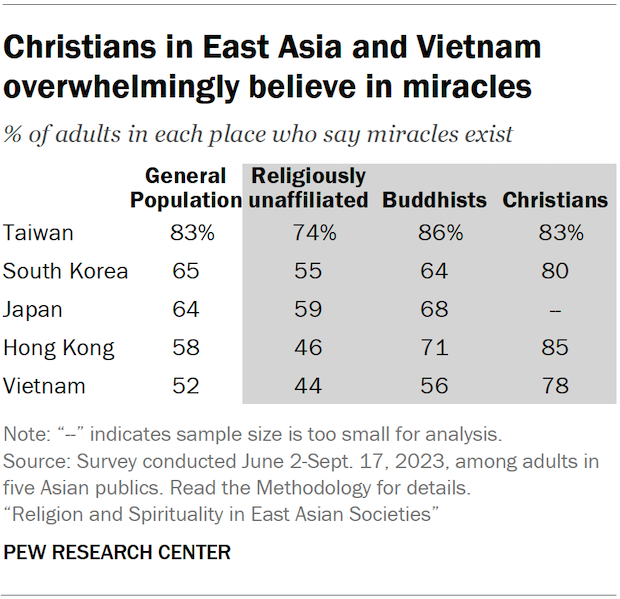
This view is especially common in Taiwan, where 83% of adults, including 74% of the religiously unaffiliated, believe in miracles.
這種觀點在台灣尤其普遍,83%的成年人,包括 74%的無宗教信仰者,相信奇蹟。
In general, Christians are more likely to say that miracles exist, followed by Buddhists and the unaffiliated. In South Korea, for instance, 80% of Christians believe in miracles, compared with 64% of Buddhists and 55% among the religiously unaffiliated.
一般來說,基督徒更有可能相信奇蹟的存在,其次是佛教徒和無宗教信仰者。例如,在韓國,80%的基督徒相信奇蹟,相比之下,64%的佛教徒和 55%的無宗教信仰者相信奇蹟。
Respondents with more education are more likely than other adults to believe in miracles. In Hong Kong, 65% of college-educated adults say that miracles exist, compared with 55% of those with less education.
受訪者中受教育程度較高的人比其他成年人更有可能相信奇蹟。在香港,65%受過大學教育的成年人表示奇蹟存在,而受教育程度較低的人中有 55%持相同看法。




